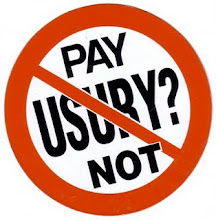Interest - Our Invisible Slavery

by Anthony Migchels
- excerpt by Henry Makow: http://www.henrymakow.com
anthony.migchels@gelre-handelsnetwerken.nl
Let's say you want to buy a house and go the bank and get a loan. Say 200k. The simple truth is, after thirty years you will have payed back 600k. 200k for the principal and 400k (!!) in interest.
Now this might be ok, or at least somewhat understandable, if you were borrowing this money from somebody else, who has been saving it. But as we know, this is not the case. The money is produced the moment the loan is granted by the bank. In a computer program. By pressing a few buttons.
So basically you pay 400k interest for pressing a button. Granted, the bank needs to manage the loan during the time it is being repaid. But the cost for this is still only a fraction of the income they get through the interest.
Now, we could stop here, because it is clear that the bank is ripping us off, also in legal terms, although they make the laws themselves, because there is no realistic service being delivered for the money.
But there is so much more, we must continue.
When the bank creates some money by giving you a loan, it takes the money out of circulation when you repay. Repaying debts means a diminishing money supply. The banks only provide the principal, in our previous example 200k. But after thirty years, 600k has been repaid and only 200k was created. So how can this be? How can 600k be repaid by 200k?
It can't. Somebody else needs to get into debt to create sufficient liquidity to pay the 400k interest. And the borrower of the original loan must start competing for this liquidity with everybody else to obtain that, intrinsically scarce, cash.
This means that because of the combination of debt and interest, the money supply must grow forever. But we know that a growing money supply is the definition of inflation and that inflation is closely linked to rising prices.
So inflation is inherent in the system. This sounds strange, because Central Banks raise interest rates to lower inflation, reasoning less credit will be issued because of rising prices for it. But the higher the interest rates go, the more money must be created to pay for this interest.
Just one of the perverse side effects of interest in the current wealth transfer system we call 'finance'.
So what of it you think. I was raised to be conservative in these matters and one should simply not get into debt, so you won't pay interest.
Wrong. Not only because if nobody went into debt, there would be no money, but because companies go into debt to finance their production. They pay interest (capital costs) over these loans. And like any cost this must be calculated into the prices they ask for their goods and services.
And what percentage of prices can be related to interest? It depends on the kind of business, particularly how capital intensive it is. Going from 12% for garbage collection to 77% for renting a house. All in all about 40% of prices can be traced back to costs for capital. These figures have been corroborated by an independent study done by Erasmus University, Rotterdam, the Netherlands under the supervision of STRO, a leading monetary think tank in the Netherlands.
So, you lose 40% (!!!!) of your disposable income to interest through prices.
Interest is being paid by people borrowing money and received by people having loads of it. So it is per definition a wealth transfer from poor to rich.
It transpires, that about 80% of the poorest people pay more interest than they receive to the richest 10%. The next richest 10% pay as much as they receive. This means the vast majority is losing a substantial part of their money to interest. The richest own the banks or have a lot of money there.
We must keep in mind that this is totally for nothing, since most of the money is printed at the time it is loaned out.
How much money are we talking about? I have only figures for Germany, but reason suggests it is basically the same everywhere.
In Germany the poorest 80% pay 1 billion Euros in interest to the richest 10% PER DAY. Yes, that's right, one billion euros per day. That is a grand total of 365 billion euro's per year. That is one seventh of German GDP and extrapolating this to America, the poorest 80% must be paying at least a trillion a year.
It conclusively explains the old adage that the rich get richer and the poor get poorer.
This is the hidden tax that nobody is talking about.
This is the yoke that we carry.
This is the worst kind of slavery, because it is slavery without even realizing it.
This is interest and let it never be forgotten.
This is our mortal enemy and let us never take our eyes of it again, until it is thrown into the fire of hell, together with the usurers enslaving us with it.
--Complete article can be found here - "On Interest" by Anthony Migchels
Margrit Kennedy is saying exactly the same thing, in this must-see video from Germany:
http://www.youtube.com/watch?v=QuBy3BzCXwg
See also http://www.monetaryreform.com
Related - A History of Usury
NOTE: This article was originally published at Henry Makow's website at this url:
http://www.henrymakow.com/interest_-_our_invisible_slave.html


0 Comments:
Post a Comment
<< Home